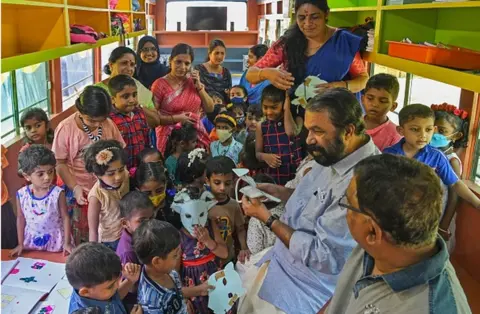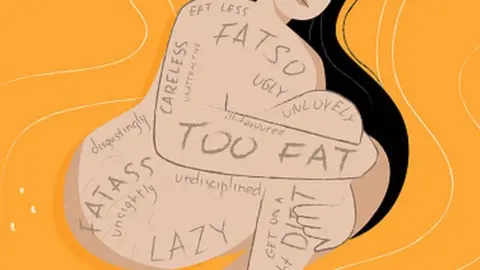Double XL: Why toxic fat shaming is so rampant in India
 Getty Images
Getty ImagesA minister in the southern Indian state of Kerala recently took to Facebook to complain about fat shaming.
In a Malayalam-language post, Education Minister V Sivankutty gave his own example of being body shamed.
He wrote that a few days back, when he shared a picture of some students taking a selfie with him, a person commented that "you should reduce your stomach a little bit".
In his reply to the comment, the minister called body shaming "a heinous practice".
"Body shaming is the worst, no matter what the explanation. This is happening in our society on so many levels. There are many among us who have been victims of body shaming and even suffered mentally," he wrote.
"We need to end body shaming. Let's be modern people," he added.
Mr Sivankutty said the incident got him thinking about how toxic body shaming could be and added that "the state government will create awareness among students and teachers, and consider making it part of the school curriculum".
The minister's comments and a recent Bollywood film, Double XL, have put the spotlight on fat shaming in India where people are routinely insulted for their physical appearance.
The film starred popular actresses Huma Qureshi and Sonakshi Sinha who have both talked about being body shamed in the past. Sinha was trolled on social media for her weight and, in her early days, Qureshi was written off by critics who believed "she was 5kg too heavy to be a heroine".
Director Satramm Ramani told the BBC that his film was about "two plus-size women who find that weight is an obstacle in the way of their dreams and how they overcome them".

"I see ambitious people with immense talent being looked down upon because of their weight. This should not be acceptable at all," he said.
Critics say India's popular Hindi film industry which influences and moulds public opinion is partly to blame for the notion that fat is foul and slim is beautiful.
A majority of the successful actresses are tall, slim and fair and a few years ago, Bollywood actress Kareena Kapoor made headlines for slimming down to "size zero".
Mr Ramani says "it's alright if people want to be size zero because they want to look a certain way, but it's not an idea that should be imposed on others".
Through his film, he says, he wants to tell people that "accept that you are beautiful, whatever your shape or size or skin colour" and give a message that "you don't have to fit into a size or frame to succeed".
A typical Bollywood film with song and dance routine, Double XL did not do well commercially, but Mr Ramani says he's happy "that people are talking about body shaming - a universal problem which exists across the world and is a very relevant topic".
It's a topic Harnidh Kaur, a plus-size poet and writer who works at an Indian unicorn, routinely raises in her columns and on social media.
Fat shaming, she says, is rampant because "most Indians have no idea about boundaries and in our families everyone comments on everyone else's appearance" and although it's "gender agnostic", it affects women more "since a woman is judged on the basis of how marriageable she is and a fat woman will fall way down on the totem pole".
Ms Kaur, who was diagnosed with polycystic ovary syndrome (PCOS) at the age of 12, says she grew up being picked on for her weight. PCOS can cause weight gain, irregular periods and hair thinning.
"Body shaming isn't always overt and negative and quite often it's also not coming from a bad place - for instance, when parents talk about your weight, it's coming from a place of worry and fear. But fat shaming can often be incredibly insidious and biases often push through real life."
She tells me about the time when a salesman approached her in a store and asked "if I'd tried any product for weight loss" or when a woman sitting at the next table in a food court told her daughter to "stop eating cookies otherwise she will also become like me" or men on dating apps who suggested working out together because "you'd look really pretty once you're thinner".
 Getty Images
Getty ImagesBut receiving "unsolicited advice on how to lose weight" and some "random aunty calling me fat" is not the real problem, she says, adding that "fat people are considered unkempt and lazy and can face discrimination in the job market".
A lot of conversation around fatness, she says, has flattened out into conversation about making fun of fat people but there is a whole medico-social-political angle to it too.
"When I went to a doctor with a very bad allergy, he said I couldn't breathe because I was too fat. When I broke my ankle, a doctor said you wouldn't have broken it in the first place if you didn't have so much body weight."
Endocrinologist Chitra Selvan says doctors are "not well trained in the art of communication" and when you speak of fat shaming, many think "it's a first world problem".
"But fat shaming can have serious social and psychological impact. Facing stigma on a daily basis impacts their self-esteem and mental health. It can lead to eating disorders and force them to withdraw socially and become more isolated."
Dr Selvan, who surveyed 900 doctors for her study The Weight of Words, found that most believed that shaming patients would spur them into taking action.
"But it doesn't work, it just frightens them into not seeking help," she says.
And that would be worse - India has more than 135 million overweight and obese people and the government and the World Health Organization (WHO) data shows the numbers are constantly growing, with doctors warning of an "obesity epidemic" in India.
"There is a connection - greater the weight, greater chances of getting diabetes," Dr Selvan says. "But weight is not necessarily a result of poor lifestyle choices - it's an extremely complex disorder which could be a result of numerous factors, including hormones and stress."
And doctors must not shame the patients, she says.
"We don't shame and blame patients who are not obese, but when I spoke to a focus group of diabetics about their experiences during clinical consultations, a majority said they'd been shamed and it was a major cause of stress for them.
"A doctor with a smirk and raised eyebrows can send a patient running back to the therapist."

Read more India stories from the BBC:

